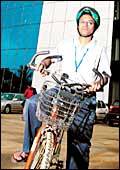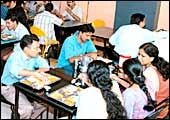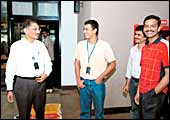 |
| Just kidding! Spending time with his
employees' kids brings a smile on Sasken CEO and Chairman
Rajiv Mody's face |
Hewlett-Packard, Microsoft, apple
Computers, and the very Indian Sasken Communication Technologies
have something in common. They are all garage start-ups. Sasken,
then, has some very large shoes to fill: hp is today a $80 billion
(Rs 3,60,000 crore) conglomerate, Microsoft is the undisputed
leader in desktop operating systems, and the iPod has made Apple
a household name. In many ways Sasken is looking to adopt the
same maverick work culture of hp (Garage Rules, the company's
founders called it) several thousand miles away at its Bangalore
hq. The company, which made an IPO this year (oversubscribed 78
times; an offer price of Rs 260; a listing price of Rs 400; and
a current market price of Rs 328.5), is on the fast track. It
has opened new campuses in Pune and Delhi and is eyeing Chennai
as its next location. And after a brief disastrous foray into
products, Sasken has sharpened its focus and is today a pure telecom
software company. The change seems to have worked: Sasken's 1,700
professionals have made 27 patent filings (and won five awards)
and have had the satisfaction of seeing five million phones run
on their IP (that's intellectual property).
 Sasken's
success in the marketplace is less an indication of the skill
of its engineers (although they are fairly skilled), more a testament
to the employee-friendly policies. While everyone has the same
size cubicle, the same flying and parking privileges, Sasians
(as employees at this company are called) are challenged to come
up with new and innovative ideas, with senior executives just
a cubicle away for help. Hari Iyer, People head at Sasken, says
that a theory of equity presides over all interactions at Sasken.
"We don't want anyone to feel inferior here, everyone's expected
to come up with new ideas and challenge the existing set up,"
he explains. Putting people first means that Iyer gave up a Sunday
siesta one day a few years ago to interview the current Chief
Marketing Officer, Swaminathan Krishnan. "I wanted to return
to Bangalore and Sasken was one of the places I applied,"
remembers Krishnan. "Iyer was happy to meet me on a Sunday,
with me dressed in casuals and with no CV in hand." And the
CMO, in turn, is expected to pass on this people-oriented nature
to his subordinates. "This means that new recruits don't
call me Sir and they work on their own terms," says Krishnan.
For others such as Milind Gandhe, a 10-year veteran at the company,
the flexibility of Sasken's People Policy means that he can take
weeks off to recover from the last few months (hectic due to an
IPO he oversaw) and take his family on a South African Safari.
One of the most popular hr concepts in the company is Hibernation,
where stressed code jocks get a six-week break after working for
four years. While Gandhe will be on Safari, others have taken
the break to just switch off and recharge. Sasken's
success in the marketplace is less an indication of the skill
of its engineers (although they are fairly skilled), more a testament
to the employee-friendly policies. While everyone has the same
size cubicle, the same flying and parking privileges, Sasians
(as employees at this company are called) are challenged to come
up with new and innovative ideas, with senior executives just
a cubicle away for help. Hari Iyer, People head at Sasken, says
that a theory of equity presides over all interactions at Sasken.
"We don't want anyone to feel inferior here, everyone's expected
to come up with new ideas and challenge the existing set up,"
he explains. Putting people first means that Iyer gave up a Sunday
siesta one day a few years ago to interview the current Chief
Marketing Officer, Swaminathan Krishnan. "I wanted to return
to Bangalore and Sasken was one of the places I applied,"
remembers Krishnan. "Iyer was happy to meet me on a Sunday,
with me dressed in casuals and with no CV in hand." And the
CMO, in turn, is expected to pass on this people-oriented nature
to his subordinates. "This means that new recruits don't
call me Sir and they work on their own terms," says Krishnan.
For others such as Milind Gandhe, a 10-year veteran at the company,
the flexibility of Sasken's People Policy means that he can take
weeks off to recover from the last few months (hectic due to an
IPO he oversaw) and take his family on a South African Safari.
One of the most popular hr concepts in the company is Hibernation,
where stressed code jocks get a six-week break after working for
four years. While Gandhe will be on Safari, others have taken
the break to just switch off and recharge.
SNAPSHOT
REVENUES: 241.77
cr
PROFITS: 22.78 cr |
Total employees: 2,121
Attrition (per cent): 19
Average career tenure: 2.1 years
Training budget (budgeted/ actual): Rs
15,000/ 17,000 (per person)
Training man-hours (budgeted/ actual): 15,000/
17,655 |
Most people believe working in an IT firm means long hours and
repetitive tasks (it sometimes does). Sasken prefers to view itself
as a tech hotshop, where employees can switch departments and
divisions if they feel jaded in their current position. Leveraging
the 3c Model-Competence, Commitment and Character- Sasians often
make a switch just to test themselves at something new and untried.
Vinay Dabholkar, 32, who started off as a specialist in the geeky
field of electronic design automation, will soon (after a Hibernation
of course) make a switch to the customer-centric field of marketing.
"This means going back to my books and reorienting myself
for a job that requires more fieldwork and travel," says
Dabholkar. Like other innovation hotbeds, dress codes are non-existent
(Dabholkar meet us in a grey T-shirt, jeans and leather slippers)
and the hierarchy has just five layers. "Deadlines are sacrosanct,
but at the same time, (Rajiv) Mody (the CEO) and other senior
executives always encourage us to balance work and life,"
he adds. This means Dabholkhar doesn't have to come in on weekends
and can catch a game of badminton with his wife and eight-year-old
son or sharpen his fluting skills (the flute is his latest musical
passion after keyboards and the tabla). "You have to respect
the people who work for you and this means going the extra mile
to ensure that they are happy both at work and while they are
away from their cubicles," says Mody. "We take a lot
of pride in our people practices," says Krishnan and rattles
off specifics: Sasken is the smallest (by revenue size not by
its grant) sponsor of the post graduate diploma in software management
held at the Indian Institute of Management; it pays half the health
insurance premium of employees; imports ergonomic chairs, rather
than buying local variants, and more such.
A DAY
IN THE LIFE OF
VINAY DABHOLKAR, 35 Program Manager/Sasken
Communication Technologies |
 |
| Cycling his way to work; that's none
other than Sasken's Program Manager Vinay Dabholkar |
It's hard to miss Vinay Dabholkar.
He cycles to work from his home a few kilometres away. When
his first cycle was stolen from outside Sasken's campus,
he just acquired a new one, this time with shock absorbers
(to protect his laptop, he claims). His wife, a teacher
at the upscale Bangalore International School, drives to
work (she has a longer commute). Dabholkar, a seven-year
veteran of Sasken, is an IIT, Bombay alum, who moved to
India after a stint with Motorola in the US. His geeky exterior
hides a steely core, something I discover during a conference
call he has with a European client that I sit in on; he
goads, badgers, even bullies responses from an initially
hesitant client. The conference room itself is bare, except
for a new age phone and ergonomic chairs, something that
Dabholkar says reflects the egality of the workplace at
Sasken. Some more work and it is time for lunch (Thai today)
at the company's canteen. "I have had offers from other
companies but the incentives from Sasken are just too good
to pass up," he says, adding that he shortly proposes
to go into Hibernation, where employees who have spent four
years with the company get six-weeks of paid leave (Dabholkar
will use his time to recharge for a switch to marketing).
As we walk back, Dabholkar rattles off the other benefits
at Sasken: two-weeks of paternity leave, no concept of time
in and time out, a liberal leave policy, and the freedom
to buttonhole CEO Mody wherever and offer him suggestions.
The rest of the day (a long one) passes in a blur: more
meetings, more calls, and the like as Dabholkar races to
meet deadlines before a long weekend (the Diwali weekend)
that looms.
|
Not too long ago (five years ago), Sasken was a small start-up,
which conducted business meetings over a mug of beer; things have
become a lot more professional today. "When we were small
the kind of work we did was different," says Iyer. "Today
the company's grown significantly; we are no longer just working
on single project but engaging with the customer." To keep
pace with this change, employees spend more hours in the classroom,
broadening their domain knowledge and technical expertise. Sasians
can avail of a one year sabbatical to update their knowledge,
with no compulsion to return to the fold. "We need to provide
people with the right work environment for us to fully utilise
their skills," adds Mody. "Contrary to perception, services,
not just products, can be a highly-innovative area."
 |
| Healthy diet: Sasken employees enjoying
a meal |
 |
| Interacting with employees: Mody (L)
seems to be enjoying it |
In a market dominated by large companies, a company such as Sasken
has its task cut out. It doesn't offer the highest salaries in
the business. "This means that we (the top management) have
to work that much harder to keep talent at Sasken," says
Mody. Four years ago, Sasken had to swallow a bitter pill when
it initiated 20 per cent salary cuts across the board to stay
afloat in a moribund market. Today, Iyer says the challenges are
very different. "We are a growing company will be hiring
some 400 freshers this year; the challenge is to create an exciting
place to work for them." Mody admits that while Sasken has
done well in terms of business over the past 12 months, there
are specific people pain-points that the company needs to address
if it is to sit at the high-table of business. "Attrition
is a definite concern and it's a number I would definitely like
to bring down; starting salaries are something we also need to
look at when we consider how quickly the market is changing,"
he enumerates. That's not all; given Sasken's intense focus on
telecom software, finding skilled people, especially capable mid-management,
is going to be a challenge for the organisation as it expands.
In addition, employees who wish to follow a purely technical path
don't yet have a clear career path ahead of them at the company.
"We are working on this facet," says Iyer. "Given
our technology-orientation, it is inevitable that we have employees
who want to focus on this rather than get into people management."
Its continued presence in this listing (it was #1 last year) implies
that Sasken is good at addressing such issues.
INTERVIEW/RAJIV
MODY/CEO
"I don't believe in time cards" |
|
 Excerpts
from an interview with Sasken CEO and Chairman
Rajiv Mody. Excerpts
from an interview with Sasken CEO and Chairman
Rajiv Mody.
Salaries in the IT industry seem
to be increasing constantly. Do you think these hikes are
sustainable over the long term?
Our starting salaries are not the greatest,
we offer around Rs 2.5 lakh per annum, compared to Rs 3
lakh-plus that some others do. But we believe that the best
and brightest minds join us because we are growth-oriented.
I believe that there's a mad rush to get rich fast among
youngsters and I don't believe that this is sustainable.
People need to work for a while and gain experience before
they can head a team; this is not something that happens
overnight. The real problem will happen if and when the
market slows down; when they're (employees are) caught with
no place to sit when the music stops.
Sasken's adopted some innovative
employee practices that seem to give your employees a lot
more freedom than other organisations...
The people working for me are adults
and I treat them with respect; I don't believe in time cards.
Employees are free to come in when they want and I only
want to reach their targets on time. We have just five levels
of management and everyone including me has the same size
cubicle and travels economy class. While we drive our employees,
we also believe in giving people a break from work, so we
have the concept of Hibernation, where people who've slogged
for four years or more can take six weeks off at our expense.
Is attrition a problem for Sasken
and do you believe there is a war on for talent? What can
you and the industry itself do to curb this?
Attrition is clearly a problem for the
industry and at Sasken too. I would like to reduce this
statistic significantly. There's an undeniable war on for
talent and since we don't pay top dollar, we also need to
clearly define job roles and ensure that each employees'
job is enriched. We need to strengthen our mid management
and ensure they get more autonomy and responsibility; my
job is to only enrich and mentor these managers.
Sasken's come a long way from the
company that started in a garage 16 years ago. Do companies
in such a growth phase begin to lose their original identity?
We try and have meetings across functions
and departments to try and foster that small company mentality.
As we grow in size, we also need to find ways of handling
the pain points that come with larger scale. These may relate
to attrition or the need to make each employee feel that
their role and contribution is vital to the success of Sasken.
|
|





 Sasken's
success in the marketplace is less an indication of the skill
of its engineers (although they are fairly skilled), more a testament
to the employee-friendly policies. While everyone has the same
size cubicle, the same flying and parking privileges, Sasians
(as employees at this company are called) are challenged to come
up with new and innovative ideas, with senior executives just
a cubicle away for help. Hari Iyer, People head at Sasken, says
that a theory of equity presides over all interactions at Sasken.
"We don't want anyone to feel inferior here, everyone's expected
to come up with new ideas and challenge the existing set up,"
he explains. Putting people first means that Iyer gave up a Sunday
siesta one day a few years ago to interview the current Chief
Marketing Officer, Swaminathan Krishnan. "I wanted to return
to Bangalore and Sasken was one of the places I applied,"
remembers Krishnan. "Iyer was happy to meet me on a Sunday,
with me dressed in casuals and with no CV in hand." And the
CMO, in turn, is expected to pass on this people-oriented nature
to his subordinates. "This means that new recruits don't
call me Sir and they work on their own terms," says Krishnan.
For others such as Milind Gandhe, a 10-year veteran at the company,
the flexibility of Sasken's People Policy means that he can take
weeks off to recover from the last few months (hectic due to an
IPO he oversaw) and take his family on a South African Safari.
One of the most popular hr concepts in the company is Hibernation,
where stressed code jocks get a six-week break after working for
four years. While Gandhe will be on Safari, others have taken
the break to just switch off and recharge.
Sasken's
success in the marketplace is less an indication of the skill
of its engineers (although they are fairly skilled), more a testament
to the employee-friendly policies. While everyone has the same
size cubicle, the same flying and parking privileges, Sasians
(as employees at this company are called) are challenged to come
up with new and innovative ideas, with senior executives just
a cubicle away for help. Hari Iyer, People head at Sasken, says
that a theory of equity presides over all interactions at Sasken.
"We don't want anyone to feel inferior here, everyone's expected
to come up with new ideas and challenge the existing set up,"
he explains. Putting people first means that Iyer gave up a Sunday
siesta one day a few years ago to interview the current Chief
Marketing Officer, Swaminathan Krishnan. "I wanted to return
to Bangalore and Sasken was one of the places I applied,"
remembers Krishnan. "Iyer was happy to meet me on a Sunday,
with me dressed in casuals and with no CV in hand." And the
CMO, in turn, is expected to pass on this people-oriented nature
to his subordinates. "This means that new recruits don't
call me Sir and they work on their own terms," says Krishnan.
For others such as Milind Gandhe, a 10-year veteran at the company,
the flexibility of Sasken's People Policy means that he can take
weeks off to recover from the last few months (hectic due to an
IPO he oversaw) and take his family on a South African Safari.
One of the most popular hr concepts in the company is Hibernation,
where stressed code jocks get a six-week break after working for
four years. While Gandhe will be on Safari, others have taken
the break to just switch off and recharge.


 E
E